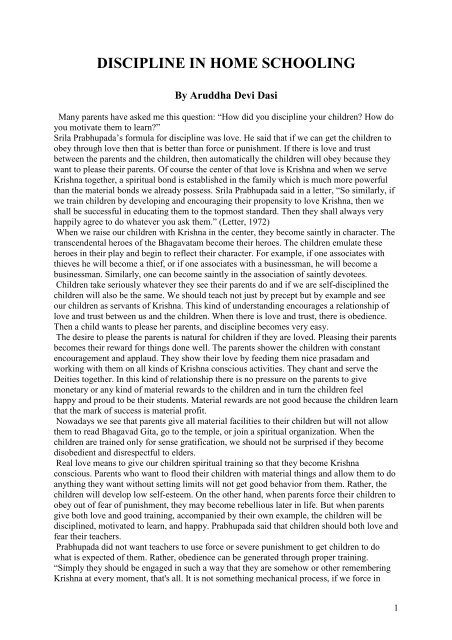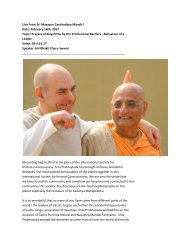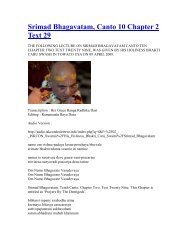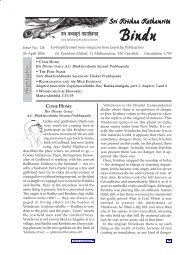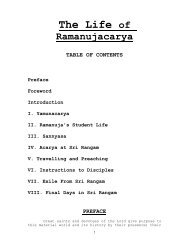DISCIPLINE IN HOME SCHOOLING - ebooks - ISKCON desire tree
DISCIPLINE IN HOME SCHOOLING - ebooks - ISKCON desire tree
DISCIPLINE IN HOME SCHOOLING - ebooks - ISKCON desire tree
You also want an ePaper? Increase the reach of your titles
YUMPU automatically turns print PDFs into web optimized ePapers that Google loves.
<strong>DISCIPL<strong>IN</strong>E</strong> <strong>IN</strong> <strong>HOME</strong> SCHOOL<strong>IN</strong>GBy Aruddha Devi DasiMany parents have asked me this question: “How did you discipline your children? How doyou motivate them to learn?”Srila Prabhupada’s formula for discipline was love. He said that if we can get the children toobey through love then that is better than force or punishment. If there is love and trustbetween the parents and the children, then automatically the children will obey because theywant to please their parents. Of course the center of that love is Krishna and when we serveKrishna together, a spiritual bond is established in the family which is much more powerfulthan the material bonds we already possess. Srila Prabhupada said in a letter, “So similarly, ifwe train children by developing and encouraging their propensity to love Krishna, then weshall be successful in educating them to the topmost standard. Then they shall always veryhappily agree to do whatever you ask them.” (Letter, 1972)When we raise our children with Krishna in the center, they become saintly in character. Thetranscendental heroes of the Bhagavatam become their heroes. The children emulate theseheroes in their play and begin to reflect their character. For example, if one associates withthieves he will become a thief, or if one associates with a businessman, he will become abusinessman. Similarly, one can become saintly in the association of saintly devotees.Children take seriously whatever they see their parents do and if we are self-disciplined thechildren will also be the same. We should teach not just by precept but by example and seeour children as servants of Krishna. This kind of understanding encourages a relationship oflove and trust between us and the children. When there is love and trust, there is obedience.Then a child wants to please her parents, and discipline becomes very easy.The <strong>desire</strong> to please the parents is natural for children if they are loved. Pleasing their parentsbecomes their reward for things done well. The parents shower the children with constantencouragement and applaud. They show their love by feeding them nice prasadam andworking with them on all kinds of Krishna conscious activities. They chant and serve theDeities together. In this kind of relationship there is no pressure on the parents to givemonetary or any kind of material rewards to the children and in turn the children feelhappy and proud to be their students. Material rewards are not good because the children learnthat the mark of success is material profit.Nowadays we see that parents give all material facilities to their children but will not allowthem to read Bhagavad Gita, go to the temple, or join a spiritual organization. When thechildren are trained only for sense gratification, we should not be surprised if they becomedisobedient and disrespectful to elders.Real love means to give our children spiritual training so that they become Krishnaconscious. Parents who want to flood their children with material things and allow them to doanything they want without setting limits will not get good behavior from them. Rather, thechildren will develop low self-esteem. On the other hand, when parents force their children toobey out of fear of punishment, they may become rebellious later in life. But when parentsgive both love and good training, accompanied by their own example, the children will bedisciplined, motivated to learn, and happy. Prabhupada said that children should both love andfear their teachers.Prabhupada did not want teachers to use force or severe punishment to get children to dowhat is expected of them. Rather, obedience can be generated through proper training.“Simply they should be engaged in such a way that they are somehow or other rememberingKrishna at every moment, that's all. It is not something mechanical process, if we force in1
such a way they will come out like this, no. We are persons, and Krishna is a Person, and ourrelationship with Krishna He leaves open as a voluntary agreement always, and that voluntaryAttitude-Yes, Krishna, I shall gladly co-operate whatever you say—that ready willingness toobey is only possible if there is love.. Superficially, strictness may be necessary—somematerial laws or basic principles—and if they don't follow, they'll be reprimanded. But theyshould develop the idea of love.” (Letter, 1972).How to Deal with MisbehaviorOne thing that worked well for us in dealing with our children’s naughtiness and misbehaviorwas to keep them always engaged in some Krishna consciousness activity. If the children arenot sufficiently engaged it is natural that they will create problems and demand attention. Weshould channel their naughtiness into productive behavior, so that they can spend their energyand be happy and active. Children are playful by nature; we should not try to curb theirplayfulness but rather dovetail their energy to Krishna conscious activities.The whole purpose of punishment is to change the heart, not just to instill fear. Prabhupadaoften gave the example of the thief who commits theft despite knowing that he will bepunished, because his heart has not been purified. So the solution is to help the childrencontrol their senses through Krishna consciousness. The Bhagavad Gita says that by getting ahigher taste one can give up lower tendencies. The same principle applies to children. If weengage them properly in Krishna conscious activities, they will give up their <strong>desire</strong>s tomisbehave, and even if they accidentally misbehave they will understand and reform quickly.If they still don’t reform some light punishment may be necessary.Personally I did not punish my children but only verbally corrected them and scolded themwhen they were naughty or did not do what they were supposed to. A firm voice and sternlook was usually enough. I tried to use the positive method as far as possible. Theyunderstood that Krishna would not be pleased with them if they misbehaved and in theprocess, we too would not be happy with them. I did not use the “grounding” or “time out”method. I felt that denying them some Krishna conscious time, food or association isunnecessary and goes against the principle of making them Krishna conscious. They becomeirritable and resentful by frequent grounding, and ultimately begin to take it lightly.Srila Prabhupada was against punishing children by not giving them prasadam. It is veryimportant for children to eat to their full satisfaction. He was also against any kind of forceddiscipline involving physical punishment or beating. Using force is not only against Vedicprinciples but can also drive away children from Krishna consciousness by giving them a badtaste.“If there is need you may shake your finger at them but never physical punishment is allowed.Try as far as possible to discipline them with love and affection, so that they develop a tastefor austerity of life and think it great fun to serve Krishna in many ways. Rising early andmangal arati, this is enough austerity. Besides that, let them learn something, chant, dance, eatas much prasadam as they like, and do not mind if they have playful nature—letthem also play and run, that is natural. It is nice if they eat often—if children overeat it doesn'tmatter, that is no mistake.” (Letter to Aniruddha,1972).Srila Prabhupada said that the children should be so trained that they enjoy performingausterities for Krishna. Good training can only be done if there is obedience, and obediencewill naturally lead to discipline. Children obey because of affection and respect for theirteachers and parents. This kind of environment motivates the children to learn and theybecome just like sponges for knowledge.2


